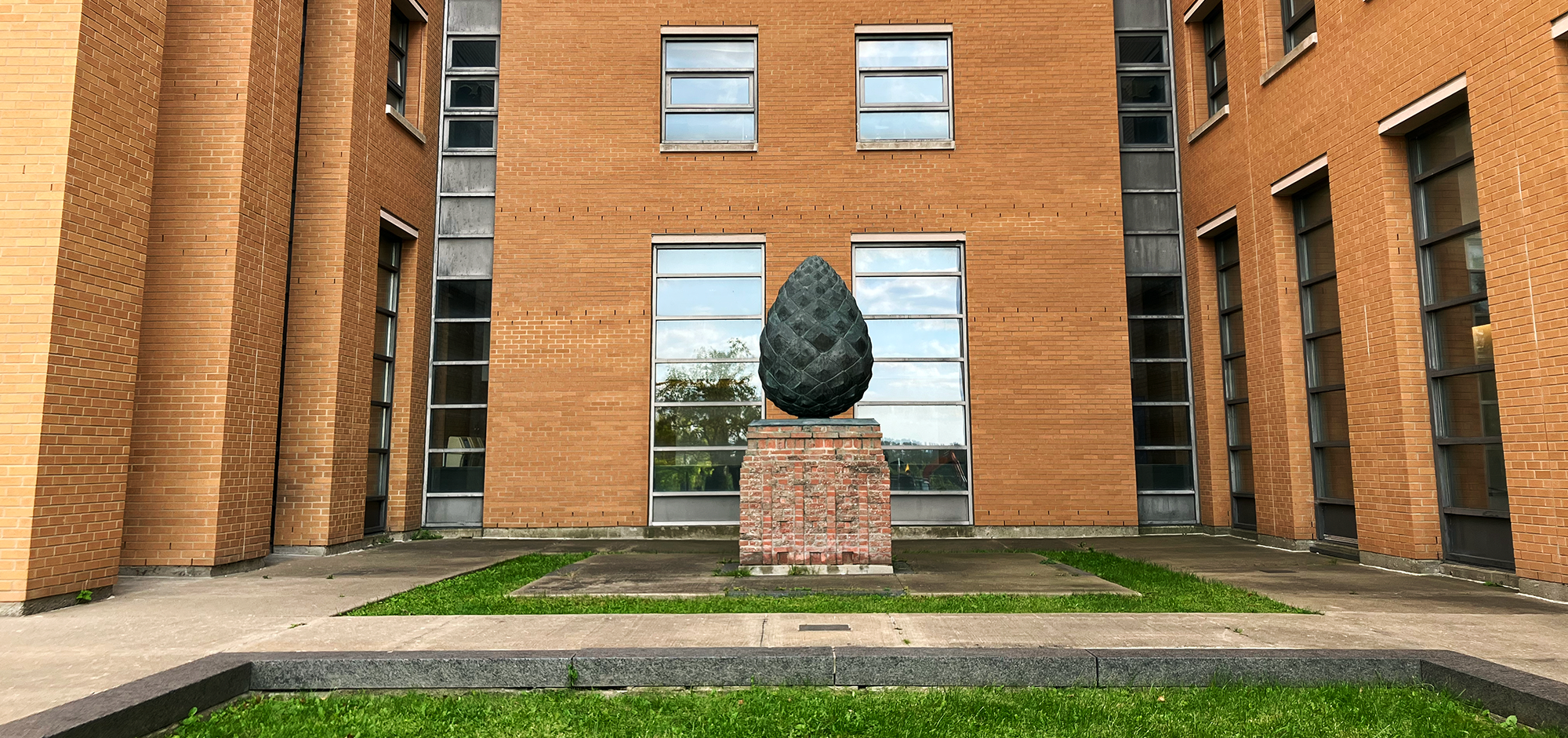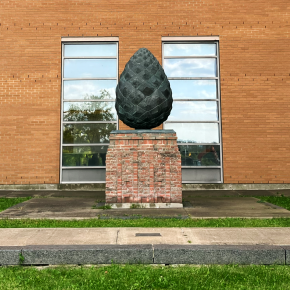The CRM-CNRS international laboratory, a nerve center for mathematical relations between Québec and France
Founded in 1968 in Montreal, the Centre de recherches mathématiques (CRM) is now considered one of the world's leading mathematical research centers. Its links with France, and more specifically with the CNRS, took concrete form in 2011, with the creation of an international joint unit attached to the CRM, now known as the lRL CRM-CNRS. On the occasion of the appointment of its new director, Emmanuel Royer, in September 2024, Insmi looks back on this flourishing collaboration.

A unique institution in Canada
In 1968, a number of Quebec universities decided to bring together all of Quebec's mathematical talent, creating what was at the time a unique structure, the Centre de recherches mathématiques (CRM). These founding universities - Université de Montréal, Concordia University, Université Laval, McGill University, Université du Québec à Montréal and Université de Sherbrooke - later integrated the University of Ottawa into their partnership, extending the CRM's influence beyond Quebec. Both French- and English-speaking, these universities have decided, through this structure, to bring together mathematicians from all over the world around a wide range of activities.
The CRM is one of Canada's three major mathematics centers, and also the oldest. Together with the Fields, located in Toronto and founded in 1994, and the Pacific Institute for Mathematical Sciences (PIMS), created in 1996, they cover the whole of Canada. Comprising thirteen laboratories, the CRM has a unique dual structure: it is both a center with international programming organized into thematic semesters, and a federation of laboratories. As Olivier Lafitte, former director of the IRL CRM-CNRS, points out, the CRM covers the whole spectrum of mathematics, “ and more besides ”. Other sciences, such as computer science and theoretical physics, are also part of the CRM's scope, giving it a multidisciplinary aspect.
The various CRM laboratories:
- Mathematical analysis ;
- CAMBAM (Centre for Applied Mathematics in Bioscience and Medicine) ;
- CICMA (Centre interuniversitaire en calcul mathématique algébrique) ;
- CIRGET (Centre interuniversitaire de recherches en géométrie et topologie) ;
- GIREF (Groupe interdisciplinaire de recherche en élements finis) ;
- LACIM (Laboratoire d'algèbre, combinatoire et d'informatique mathématiques);
- Applied Mathematics;
- MILA (Montreal Artificial Intelligence Laboratory) ;
- Mathematical Physics ;
- PhysNum (digital physics laboratory);
- Probability ;
- Quantact (financial and actuarial mathematics laboratory);
- Statistics.
The many activities of the CRM and its laboratories play an important role in the training of new generations of researchers. As a key venue for scientific meetings in Quebec, the CRM makes a major contribution to the advancement of international research collaborations in mathematics, following the example of the Cirm or the IHP in France.
In 2011, it was decided with the CNRS to create an international mixed unit associated with the CRM, following in the footsteps of the one created in 2007 with the PIMS. This unit, now known by the acronym IRL CRM-CNRS, has been renewed three times. On September1, 2024, the IRL welcomes its new director, Emmanuel Royer, who succeeds Olivier Lafitte. The laboratory's mission is to provide an institutional framework for fruitful cooperation between France and Quebec in the mathematical sciences, and to increase collaboration between French and Quebec mathematicians.
A breeding ground for researchers
The CRM's varied activities are designed to promote the mathematical sciences across Canada and beyond. These include the organization of international workshops, conferences and thematic semesters, as well as hosting teacher-researchers and researchers for stays of varying lengths. In this context, the IRL CRM-CNRS offers CRM scientists and students the opportunity to spend research periods in France. At the same time, every year Insmi offers researchers from its units the opportunity to spend a medium- or long-term stay at the IRL.
The MRC's influence is also expressed through its funding of prizes and chairs. In conjunction with PIMS and Fields, it awards the CRM-Fields-PIMS prize. This is the most important recognition in Canada for research achievements in the mathematical sciences, mainly carried out in Canada. The center also funds prestigious post-doctoral fellowships and, since 1992, has awarded the André-Aisenstadt Mathematics Prize. This is the name of the building in which the CRM is housed at the Université de Montréal.
The Aisenstadt Chairs, for their part, host renowned mathematicians in each of the CRM's thematic programs, for stays ranging from one week to one semester. They are invited to give a series of lectures on a topic related to the thematic program, chosen for its interest and impact in the field. In accordance with the donor's request, the first lecture in the series must be accessible to a wide audience. Since 1970, almost since the creation of the CRM, these chairs have been a great success.
According to Emmanuel Royer, this wide range of activities makes the CRM “ a privileged setting for doing research with a mind free of all other constraints ”. “ Whether it's for two weeks, six months or a year, it's an opportunity. The French-speaking aspect also makes things easier, as daily life is simpler to understand. “ And beyond Quebec, the CRM, through its relationships, represents an opening onto North America and other scientific disciplines,” adds Olivier Lafitte. Encouraging the arrival of researchers is therefore one of IRL's priorities, despite the fears expressed in recent years, such as “ the growing complexity of administrative tasks ”, according to Emmanuel Royer. This administrative hurdle has not, in fact, prevented the IRL from growing, as it currently welcomes around ten researchers on assignment.
Testimony of Claire Guerrier, CNRS researcher who was first assigned to the IRL CRM-CNRS in 2021/2022 and who has been assigned again since 2023.

I met Anmar Khadra, a professor at McGill University in the Department of Medicine and Physiology, in 2018 in Montreal. Anmar is a mathematician working in computational biology. He had some very interesting data on myelin plasticity, and we quickly began a collaboration on this topic. My son was born in 2018, and I took up my first position in September 2019. Making progress in my work with jet lag and family constraints wasn't easy. A colleague told me about the opportunity to spend a year at IRL-CRM, at the University of Montreal, so I jumped at the chance. Being there enabled me to take part in Anmar's group meetings, meet experimental collaborators in person, and co-supervise Master's students, which was a real springboard for progress in the work.
I also met several colleagues assigned to the IRL like me, and was even able to start a new collaboration. Montreal is a dynamic university city with several universities. The scientific environment is very rich, which means you can meet a lot of people. Also, being away from lab life has given me a kind of peace of mind, a feeling of being “hidden away”, and of having more time available for research. I love working in these conditions!
On a personal note, my partner was also very happy to be in Montreal, and I was able to leave with two young children without any worries. School and daycare are pretty similar to France, so we always manage to get things organized. I then left for a second stay, this time with three children. I can only encourage colleagues to go, and to bring the family if necessary. Montreal is French-speaking, so organization isn't too complicated, and it's a real breath of fresh air for work and everyday life. From my point of view, it's an exceptional opportunity.
For Emmanuel Royer, who is taking over as head of IRL, the objective is clear. He wants to “continue to broaden the IRL spectrum, by encouraging new collaborations without destroying existing ones. I want to make people aware of the various means of financing that already exist and that are, to date, under-utilized. It's also important to make decision-makers in Quebec, Canada and France understand the need for long-term investment in mathematics.”
